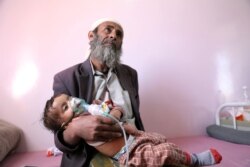U.S. Secretary of State Antony Blinken said Friday that he would revoke designations of Yemen’s Houthi movement as a terrorist group.
Blinken said in a statement the group would no longer be designated a foreign terrorist organization or a specially designated international terrorist group effective February 16.
“This decision is a recognition of the dire humanitarian situation in Yemen,” Blinken said.
The announcement reversed actions taken by the Trump administration and signaled a policy shift by President Joe Biden.
The Biden administration hopes the revocations will help ease the world’s worst humanitarian crisis, as it also ramps up diplomatic efforts to end Yemen’s six-year civil war.
'Very welcome'
U.N. spokesperson Stephane Dujarric reacted positively to Blinken’s announcement, saying, “We hope that helps build momentum for a political solution to the conflict in Yemen. I think the reversal of the [Houthi] designation, the naming of the [U.S.] special envoy, and the clear, clear language from the top of the U.S. administration, from President Biden himself, expressing his strong support for the U.N. mediation and political peace process, are very welcome indeed.” Dujarric expressed optimism that ultimately a nationwide cease-fire could be reached.
The Iranian-backed Houthi movement has clashed with Yemen’s globally recognized government that is supported by a Saudi-led coalition.
U.N. humanitarian chief Mark Lowcock warned last month that if Washington’s terrorist designations of Houthi rebels were not reversed, they could drastically affect aid imports and push the already desperate country into a large-scale famine.
According to U.N. data, an estimated 16 million people, including 2.3 million children under age 5, will go hungry in the war-torn country this year. Another 50,000 Yemenis already live in faminelike conditions, while 5 million more are right behind them.
Without immediate care, 400,000 of the youngsters could suffer severe acute malnutrition and could die without immediate care.
The physical and cognitive damage malnutrition does to children in their first two years is “largely irreversible,” U.N. agencies said.
“The increasing number of children going hungry in Yemen should shock us all into action,” said UNICEF Executive Director Henrietta Fore. “More children will die with every day that passes without action.”
Compounding the children's malnutrition is the malnutrition of Yemen’s 1.2 million pregnant or breastfeeding women.
Country's 'toxic mix'
“Families in Yemen have been in the grip of conflict for too long, and more recent threats such as COVID-19 have only been adding to their relentless plight,” said Food and Agriculture Organization Director-General Qu Dongyu. “Without security and stability across the country, and improved access to farmers so that they are provided with the means to resume growing enough and nutritious food, Yemen’s children and their families will continue to slip deeper into hunger and malnutrition.”
“The crisis in Yemen is a toxic mix of conflict, economic collapse and a severe shortage of funding to provide the lifesaving help that’s desperately needed, World Food Program Executive Director David Beasley said in a statement. “But there is a solution to hunger, and that’s food and an end to the violence. If we act now, then there is still time to end the suffering of Yemen’s children.”
VOA's Margaret Besheer contributed to this report.






